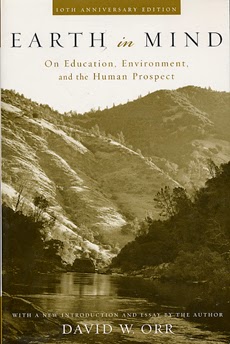
This year, 2019, represents the 25th anniversary of David Orr’s Earth in Mind: On Education, Environment, and the Human Prospect. (I read the 10th anniversary edition, published in 2004.)
The book was sitting on my bookshelfI believe I saw it on Amazon and ordered it some time ago. Meanwhile, I received notice from the Grand Rapids chapter of the AIA that an notable environmentalist (Orr) would be speaking in west Michigan. Only after attending Orr’s speech did I but two and two together and pull Earth in Mind off the shelf.
Hearing Orr speak, and then reading Earth in Mind, was both depressing and uplifting: depressing because we have, in many ways, gone backwards in the past 25 years (especially since 2016), but uplifting, because people like Orr exist—people who understand the difficulties facing humanity and who working to make real change.
Earth in Mind is a collection of essays, and, thus, it becomes a little repetitive. That said, the book contains many thought-provoking passages, including the following two examples.
First, Orr argues that technical education alone is not only worthless but potentially dangerous. To make his point, Orr makes a comparison that initially seems bizarre: the lives of Aldo Leopold and Albert Speer. Orr argues that both Leopold and Speer were technically well educated but that Leopold used his expertise for good (rethinking humanity’s relationship to the Earth) while Speer used his expertise for evil (managing Nazi Germany’s armament industry). Both men were technically competent, but Speer used his competence for amoral (then immoral) careerism, while Leopold used his career to deepen his since of ethics.
Second, Orr argues that we will not engineer our way out of the looming global climate catastrophe. He wrote, “We won’t be rescued by more research, hypertechnology, or some deus ex machina. There is no anonymous ‘they’ who will figure things out. No cavalry will ride over the hill to rescue this wagon train.” Personally, I am more sanguine that technology can help solve the challenges of global climate change, but I agree that technology alone—particularly in absence of a greater sense of ethics—is not the full solution.